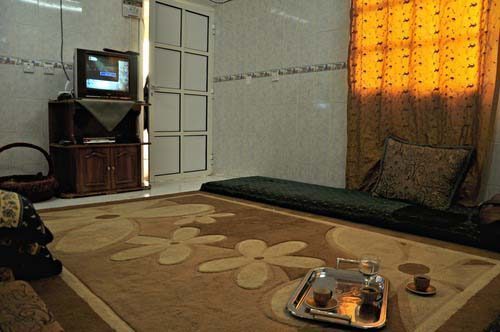
- Photo credit: Nora Basha
Eleven-year-old Salwa (not her real name) hasn’t been to school in nearly two years. More recently, she and her family escaped the fighting in Syria for the quiet of Qatar, but her academic status hasn’t changed.
“She will forget everything she learned,” says Salwa’s mother, an unofficial Syrian refugee in Doha who says she can’t get her into school here. “She will even forget how to write her own name.”
Although no official counts have been released, members of the Syrian community here estimate that there are – at minimum – several hundred unregistered refugees who have fled to Qatar since the civil war began more than two years ago.
Qatar has been one of the most vocal critics of embattled President Bashar Al-Assad, is a prominent supporter of Syrian opposition groups, has donated millions of dollars in humanitarian aid for refugees and is reportedly arming rebel forces in Syria.
Syrian families have told Doha News they are grateful to be safe and sound here, but wish there were more support programs to assist them, both with schooling and otherwise.
“Qatar has been terrible in dealing with Syrians here, ” says Nour, an activist in the Syrian community of Doha. “Even the few (parents) who pulled connections and paid lots of money are not able to enroll their kids in schools, private or government.”
Mixed response
However, Michael Stephens, a researcher at the Royal United Services Institute for Defence and Security Studies in Qatar, says he understands the government response to Syrians fleeing here has been “a mixed bag.”
Bureaucracy in Qatar can make establishing a life here difficult, he says, but doubts the country has instituted any policy against helping refugees:
“It doesn’t surprise me that people have slipped through the cracks at all.”
(But) it would be very difficult to imagine a policy of Qatar doing what it’s doing in Syria and then at the same time acting against those people fleeing Syria to seek a better life. It just would not be very logical.”
But not knowing who to turn to for help, many refugee families in Qatar simply choose to go off the radar.
That comes at a cost though; according to the Supreme Education Council, it is illegal for students without residency permits to attend schools in Qatar.
Like Salwa, many Syrian children here are on temporary visas and cannot enroll in school. They are missing months, and in some cases, years of education.
Education aside, simply getting into Qatar has proved to be a challenge for many Syrians.
International immigration law firm Fragomen says that Qatar, the UAE and Kuwait have been limiting business, work and visitor visas for Syrians during the war. It doesn’t cite a reason, but the move is believed to be in part, due to security concerns after numerous threats from those loyal to Al-Assad’s government.
Because Salwa’s family is here on a temporary visa, they are trapped between a rock and a hard place. The family’s visa is only for one month and they have already been here for 20 days. Soon, they will be living here illegally.
“What can we do?” Salwa’s mother says in Arabic. “Go back to the massacre happening in Syria?”
Back in her hometown of Idlib, shelling and bombing have been a daily occurrence since the Civil War in Syria escalated in 2011. After school one day, Salwa says she saw one of her classmates die in front of her. His 10-year-old body lay sprawled near the school entrance.
“Going to school became a nightmare,” she says in Arabic. “I had to drop out.”
No domestic mandate
While there are humanitarian organizations in Qatar working to help children that are not in school, the majority of them focus their efforts outside the country. Educate A Child, which started in November 2012, is the latest educational initiative of Sheikha Moza bint Nasser . It works in 16 different nations and has helped to put over half a million children back in school, says Mary Pigozzi, a senior education adviser for the program and the former director of UNESCO’s education division.
But it doesn’t help children in Qatar.
“We do not limit the organization to Syrian refugees in Qatar,” Pigozzi says. “We work externally.”
Charity organizations also aren’t much help for Syrian families in Doha. Qatar Charity is the nation’s most trusted charity organization, according to a 2012 survey by Qatar University. It provides aid to people in over 50 countries, but since it is an international organization, it does not help the Syrians in Qatar.
“We are working with displaced Syrians inside Syria, Iraq, Lebanon, and Turkey,” says Mohammed Aderdor, the relief and emergency manager at Qatar Charity. “But we do not give assistance to Syrian visitors particularly here in Qatar.”

- Photo credit: Aamena Ahmed
Salwa’s older brother tried to help get funding for his sister’s education from Qatar Red Crescent, a local charity organization. He still hasn’t heard back.
“I’m already paying QR3,000 to rent the room we live in,” her brother, who is the main financial provider in the family and currently unemployed, says in Arabic. “Even if schools would accept her, where am I going to get the money?”
Oasis of community
There is, apparently, only one school that is actively working to help the Syrian refugee children in Qatar. The Syrian School in Doha is small, but alive and buzzing with noise. As soon as the school bells ring for recess, all hell lets loose.
The small building quakes as children chatter and run all over the school grounds. Teachers pull on students’ ears and smack them over the head for misbehaving. Two young boys walk out of the principal’s office with tears streaming down their faces.
Despite the chaotic scene, officials says they try to maintain a passionate sense of community here.
“There are children who come here that have never been to school in their lives,” says Faisal Mutleb, the director of the only school specifically for Syrian children in Qatar. “We have to do something.”
The school opened in 2009 to cater to the Syrian population in Qatar. There were only about 200 students at that time. Now, four years later, the school population has nearly quadrupled, reaching maximum capacity with over 950 students in attendance.
When it comes to Syrian refugee students, the school accepts them without residence permits or previous school records, Mutleb says.
“We have them take a placement test,” he says in Arabic. “And we try to forgive the tuition for as many as we can.”
But that is all the school can do, he says. They can’t really help feed or clothe the students.
“Some things are just out of our control,” Mutleb says.
Dreaming in Doha
Despite the challenges, Syrian children say they are just glad to have escaped the war in Syria.
“At least my daughter can leave the house without fear,” Salwa’s mother says. “She can walk the streets in freedom here.”
Salwa lives with her family in a small, cramped room in the servant quarters of a villa in Doha. The walls are lined with blue tiles.
Salwa looks at her mother, shy at first to speak up. There is a little fear on their faces, and in their voices. But they are eager to share more.
“Since the third grade, I’ve loved reading Arabic stories,” Salwa says. “I wanted to be a teacher and help others read stories one day.”
She hasn’t read anything in a while, her mother says.
“I want her to be educated. I want her to be ambitious,” she says. “But that’s not an option for us anymore.”
But one of these days, with the help of her brother, Salwa will grab a pencil and start writing again. Of that, her mother is confident.
Credit: Top photo by Nora Basha on Twitter; second photo by Aamena Ahmed.
Note: This article has been edited to remove the last name of the Syrian activist, at her request.
Thoughts?









